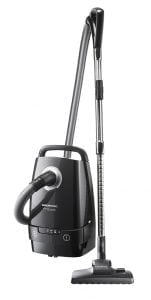A German manufacturer of electronics and appliances reported it is using recycled plastics, including nylon from fishing nets, in a number of products.
 Grundig announced it is using recycled plastics from three sources: recycled appliances processed in its parent company’s recycling facilities, PET bottles purchased on the market and polyamide sourced from recovered fishing nets.
Grundig announced it is using recycled plastics from three sources: recycled appliances processed in its parent company’s recycling facilities, PET bottles purchased on the market and polyamide sourced from recovered fishing nets.
Recycled plastics in vacuum cleaners
The Grundig Zio+ vacuum cleaner uses recycled plastics generated at parent company Arçelik’s waste electrical and electronic equipment (WEEE) recycling facilities. Based in Turkey, Arçelik is a global maker of consumer durable goods.
The Zio+ vacuum cleaner received an award this year from Plastics Recycling Show Europe.
Since 2014, Arçelik has used recycled plastics from discarded appliances in the Grundig Bodyguard Vacuum Cleaner. The plastic used in the vacuum is 90 percent recycled content.
PET replacing glass fibers
Grundig also reported on its use of RPET in tubs for a range of washer-dryers. According to parent company Arçelik’s 2017 sustainability report, the company uses a patented process to convert PET flakes into fibers to replace glass fibers in a composite material. The process was developed at Arçelik’s central R&D lab.
Production of the glass fibers requires a significant amount of energy, so Arçelik emphasized the environmental benefits of replacing glass with PET fiber.
The washer-dryer tub made from the recycled composite first went into mass production in August 2017.
The equivalent of 60 half-liter PET bottles are consumed per tub. According to Arçelik, the company is expected to consume about 250 tons of PET per year to make the tub.
Ocean plastics efforts
Grundig reported the company created a nylon-based composite material from recycling fishing nets, textiles and other scrap plastics. The composite, which has high mechanical strength and thermal resistance, is being used in Grundig ovens.
By the end of this year, the company estimates it’ll have used 65 metric tons of these plastics. In 2019, Grundig plans to expand the range of products incorporating the marine plastics, boosting annual consumption to an estimated 330 metric tons.
To help prevent marine plastics, Grundig has also developed a filter for its washing machines to catch 99 percent of fabric microfibers. Microplastics from textiles can come off in the wash, slip through sewage treatment plants and discharge into the environment.
Photo courtesy of Grundig.
To receive the latest news and analysis about plastics recycling technologies, sign up now for our free monthly Plastics Recycling Update: Technology Edition e-newsletter.
More stories about brand owners
- Unifi pushes for textile recycling progress
- Packaging giant invests to expand PCR capability
- Candy giant Mars reached 7% PCR use in 2024


